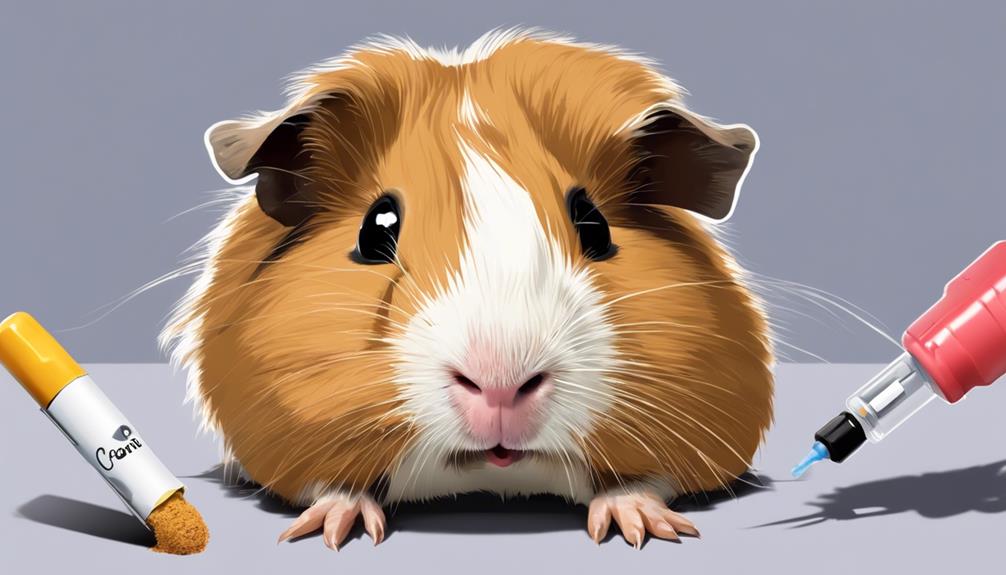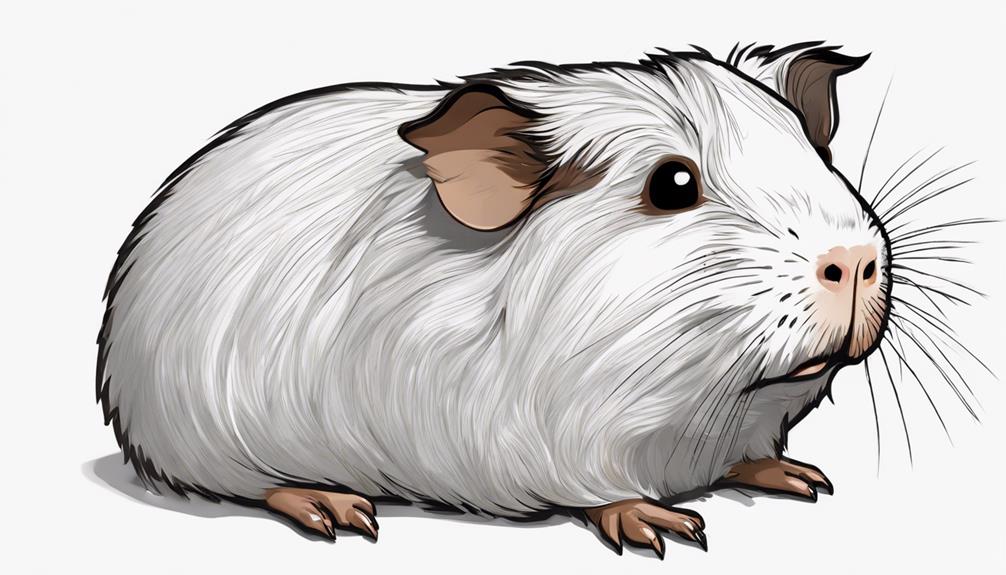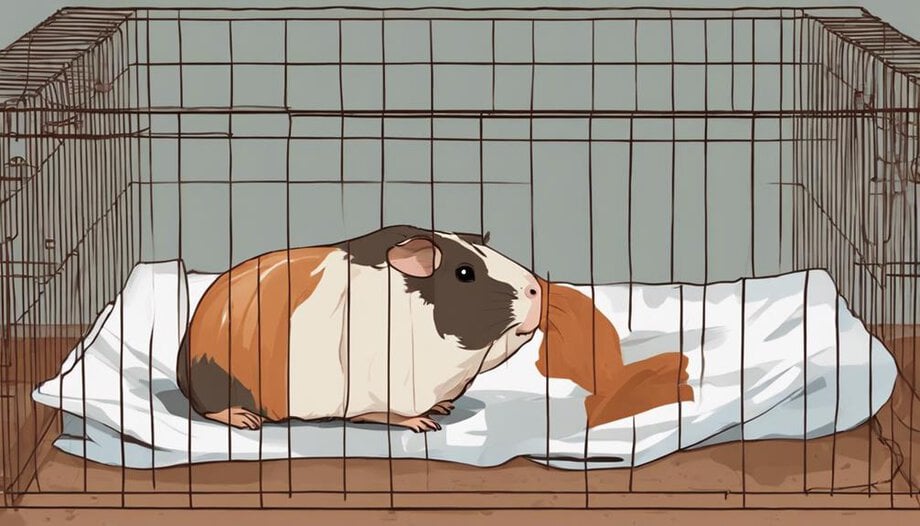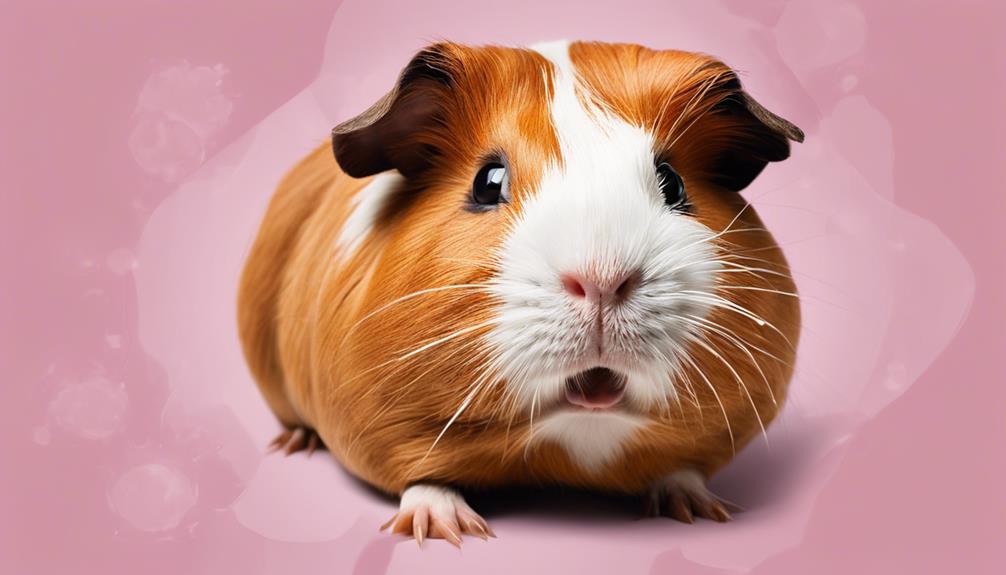How to Recognize Allergic Reactions in Guinea Pigs

Guinea pigs are popular pets known for their friendly and gentle nature. However, like all animals, they can suffer from allergic reactions that may require prompt attention. Some key signs and symptoms to watch for include:
- Skin Irritation: Guinea pigs may develop red, itchy rashes or hives on their skin in response to an allergen.
- Respiratory Issues: Allergic reactions can also manifest as sneezing, coughing, wheezing, or difficulty breathing in guinea pigs.
- Swelling: Look out for any swelling, particularly around the face, eyes, or limbs, which could indicate an allergic reaction.
If you notice any of these symptoms in your guinea pig, it's essential to consult a veterinarian immediately. Allergic reactions can escalate quickly and may require medical intervention to ensure your pet's well-being.
Key Takeaways
- Watch for skin irritations like redness, itchiness, or rashes.
- Be alert to respiratory symptoms such as sneezing, wheezing, or breathing difficulty.
- Monitor digestive issues like changes in appetite, diarrhea, or bloating.
- Note behavioral changes like lethargy, aggression, or excessive scratching.
Common Allergic Triggers
Common allergic triggers in guinea pigs include certain types of bedding and specific foods that can elicit adverse reactions in these small animals. Food intolerances are a significant concern, with guinea pigs being particularly sensitive to certain foods like dairy products, nuts, and high-sugar fruits. These can lead to digestive issues, skin irritations, or respiratory problems in these delicate creatures.
Environmental triggers, such as dusty or aromatic bedding materials like cedar shavings, can also instigate allergic responses in guinea pigs. Understanding these common triggers is essential for providing the best care for these beloved pets. By being mindful of the bedding choices and food offerings, one can create a safer and healthier environment for guinea pigs to thrive.
It's important to observe any signs of discomfort or unusual behavior in guinea pigs, as prompt identification of allergic triggers can prevent further complications and promote the well-being of these endearing companions.
Signs of Allergic Reactions
Detecting allergic reactions in guinea pigs requires keen observation of subtle changes in their behavior and physical condition. Guinea pigs, like all creatures, exhibit signs when their bodies are reacting negatively to allergens. Here are four key signs to watch for:
- Scratching and Chewing: Excessive scratching or chewing on their skin or fur can indicate an allergic reaction.
- Watery Eyes and Nose: If your guinea pig has watery eyes or a runny nose, it could be a sign of allergies.
- Skin Irritation: Redness, rash, or skin irritation may develop in response to allergens.
- Changes in Breathing: Labored breathing or wheezing could signal an allergic reaction affecting the respiratory system.
If you notice any of these signs, consulting a veterinarian promptly is crucial. They can recommend allergy testing to pinpoint the specific triggers and discuss treatment options. Seasonal changes and environmental factors play a significant role in triggering allergies in guinea pigs, so understanding these influences can help in managing and preventing allergic reactions effectively.
Respiratory Symptoms

Respiratory symptoms in guinea pigs can manifest subtly but should never be overlooked due to their potential seriousness. These small creatures, beloved for their gentle nature, may exhibit signs such as wheezing, sneezing, labored breathing, and coughing when experiencing respiratory distress. As caring companions to these delightful animals, it's vital to pay close attention to any changes in their breathing patterns.
Wheezing, characterized by high-pitched whistling sounds during respiration, is a concerning symptom that warrants immediate attention. Similarly, sneezing may indicate irritation in their respiratory tract, signaling a potential allergic reaction. Labored breathing, where the guinea pig appears to struggle for each breath, and coughing, which can be sporadic or persistent, are red flags that shouldn't be ignored.
Recognizing these respiratory symptoms promptly and seeking veterinary care can make a significant difference in the well-being of your guinea pig. By staying vigilant and responsive to their needs, we can guarantee a healthier and happier life for our beloved furry friends.
Skin Irritations
During moments of observation and care for guinea pigs, it's essential to be attuned to any signs of skin irritations that may manifest. Skin irritations can be distressing for these gentle creatures, so identifying and addressing them promptly is important.
Here are some key indicators to watch for:
- Itchy Patches: Keep an eye out for any areas where your guinea pig seems to be excessively scratching or nibbling. Itchy patches may indicate underlying skin issues that need attention.
- Redness: Redness on the skin can be a sign of irritation, inflammation, or even infection. If you notice any red patches on your guinea pig, it's important to investigate further.
- Flaky Skin: Dry, flaky skin can be uncomfortable for guinea pigs and may lead to more serious problems if left untreated. Regularly check their skin for any flakiness.
- Scabs: The presence of scabs on your guinea pig's skin could be a result of scratching due to irritation. Addressing the cause of the irritation is essential to prevent further discomfort.
Behavioral Changes

Noticing changes in a guinea pig's behavior can offer crucial clues about their well-being.
Unusual agitation, signs of distress, or a sudden preference for hiding or isolation could indicate an allergic reaction.
Unusual Agitation Signs
Upon observing guinea pigs, one may discern behavioral changes indicative of unusual agitation. In recognizing symptoms and handling stress in these delicate creatures, it's essential to pay close attention to their behavior.
Here are some signs to watch out for:
- Increased Vocalization: If a guinea pig is unusually loud or making distressed sounds, it could indicate agitation.
- Restlessness: Constant movement, pacing, or the inability to settle down may suggest heightened stress levels.
- Teeth Chattering: This audible sign of distress is a clear indicator of agitation in guinea pigs.
- Aggressive Behavior: Uncharacteristic biting, nipping, or lashing out could signal significant agitation that needs attention promptly.
Understanding these behavioral cues can help caregivers address and alleviate agitation in their guinea pigs effectively.
Hiding or Isolation
One may discern a guinea pig's heightened stress levels through their tendency to hide or isolate themselves, a behavior change that requires careful observation and intervention. When a guinea pig retreats into seclusion, it often signifies an underlying discomfort or unease.
To address this, anxiety management strategies can be implemented to help the guinea pig feel more secure and at ease in their environment. Providing hiding spots within the cage, such as igloos or tunnels, can offer a sense of security. Additionally, socialization methods, like gentle interactions and offering treats, can gradually build trust and reduce the urge to hide.
Digestive Issues
How can one identify digestive issues in guinea pigs? Maintaining a keen eye on your furry companion's well-being is important in ensuring they lead a healthy and happy life. Here are some key signs to watch for:
- Changes in Stool Quality: Keep an eye on the consistency, color, and frequency of your guinea pig's droppings. Diarrhea, constipation, or abnormal colors can signal digestive distress.
- Loss of Appetite: Guinea pigs are usually enthusiastic eaters. A sudden lack of interest in food could indicate a problem with their digestive system.
- Weight Loss: Unintentional weight loss is a common indicator of digestive issues. Regular weighing can help you monitor your pet's health.
- Abdominal Pain: If your guinea pig shows signs of discomfort such as hunching over, teeth grinding, or reluctance to be touched, it could signify digestive problems.
Maintaining a balanced diet, providing adequate hydration, and promptly addressing any digestive concerns are essential for promoting your guinea pig's digestive health and overall well-being.
Emergency Response

Observing the subtle cues of distress in your guinea pig can guide your swift and effective response in emergencies. In times of crisis, knowing the appropriate first aid and treatment options is vital. If your guinea pig shows signs of an allergic reaction such as difficulty breathing, swelling, or severe itching, immediate action is essential. Administering any prescribed medications or utilizing remedies recommended by your veterinarian can help alleviate symptoms while preparing for transport to an emergency veterinary clinic.
When facing an emergency with your guinea pig, it's important to remain calm and focused. Contacting an emergency vet for guidance or to inform them of your imminent arrival can streamline the treatment process. Prior to transportation, make sure your guinea pig is secure and comfortable for the journey. Taking precautions such as preparing a carrier with bedding and keeping the environment warm can help stabilize your pet during transit.
Being well-prepared and knowledgeable about emergency response can make a significant difference in the outcome for your beloved guinea pig.
Prevention Tips
In the domain of caring for guinea pigs, preventing allergic reactions is crucial. Recognizing the signs of allergies and ensuring a safe environment are key aspects of keeping these adorable pets healthy and happy.
Signs of Allergies
To prevent allergic reactions in guinea pigs, owners should be diligent in observing any unusual symptoms and promptly consult a veterinarian for guidance. Recognizing the signs of allergies in guinea pigs is essential for their well-being. Here are some key indicators to watch for:
- Skin Irritation: Look for redness, itchiness, or rashes on your guinea pig's skin.
- Respiratory Issues: Watch for sneezing, wheezing, or difficulty breathing.
- Digestive Problems: Pay attention to changes in appetite, diarrhea, or bloating.
- Behavioral Changes: Note any unusual behaviors such as lethargy, aggression, or excessive scratching.
Being attuned to these signs can help you address potential allergic reactions promptly and guarantee your guinea pig's health and happiness.
Safe Environment Practices
Creating a safe environment for your guinea pig is paramount to their well-being and longevity. Cage cleanliness plays an essential role in preventing allergic reactions in these sensitive pets. Regularly clean the cage, removing any waste, uneaten food, and soiled bedding. This simple practice helps maintain a hygienic environment and reduces the risk of allergens accumulating.
Additionally, safe handling is important. Wash your hands before and after handling your guinea pig to prevent any potential allergens from coming into contact with them. Avoid using strong perfumes, lotions, or cleaning products before handling your pet, as these can trigger allergic reactions.
Frequently Asked Questions
Can Guinea Pigs Develop Allergies to Specific Foods Over Time?
Guinea pigs can develop food sensitivities over time, leading to behavior changes and digestive issues. These allergies may manifest gradually, so it is crucial to monitor their reactions to different foods and consult a vet if concerns arise.
What Should I Do if My Guinea Pig Has an Allergic Reaction While I Am Away From Home?
In the event of an allergic reaction in a guinea pig while away from home, having an emergency plan is vital. Watch for allergic symptoms, contact a vet for recommendations, and consider preventive measures for their well-being.
Are There Any Natural Remedies or Supplements That Can Help Alleviate Allergic Reactions in Guinea Pigs?
Herbal remedies and supplements, along with dietary changes and probiotics, can provide relief for allergic reactions in guinea pigs. These natural options can help alleviate symptoms and promote overall well-being in these furry companions.
Can Guinea Pigs Develop Allergies to Bedding or Cage Materials?
Guinea pigs can develop allergies to bedding materials, causing respiratory symptoms, or react to cage materials, leading to skin irritation. Observing any unusual reactions and promptly addressing them by changing the environment can benefit their well-being.
How Can I Differentiate Between an Allergic Reaction and a Respiratory Infection in My Guinea Pig?
To differentiate between an allergic reaction and respiratory infection in a guinea pig, observe for symptoms like sneezing, coughing, wheezing for infection, and itching, redness, or skin issues for allergies. A vet can confirm the diagnosis and provide appropriate treatment.











